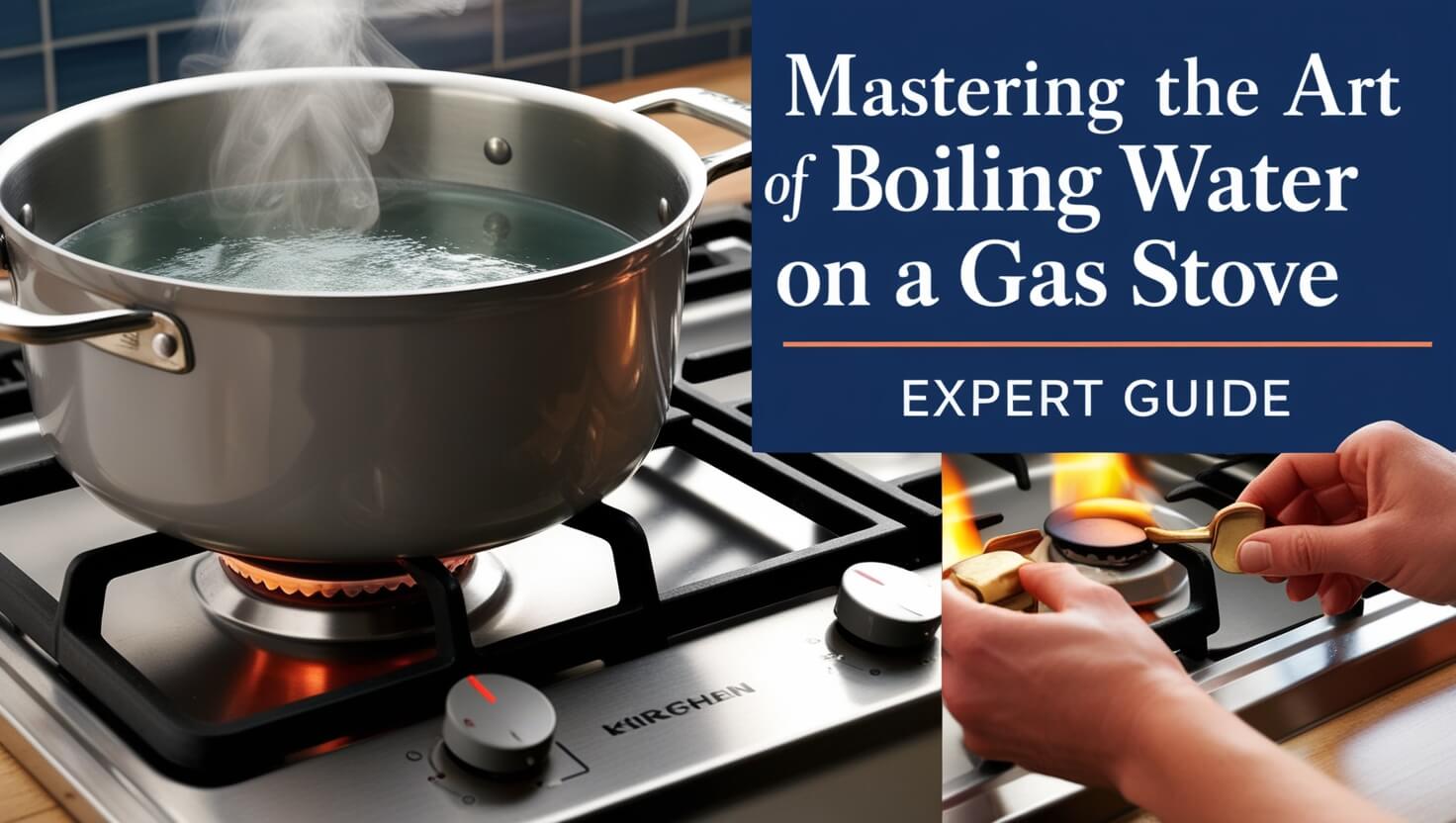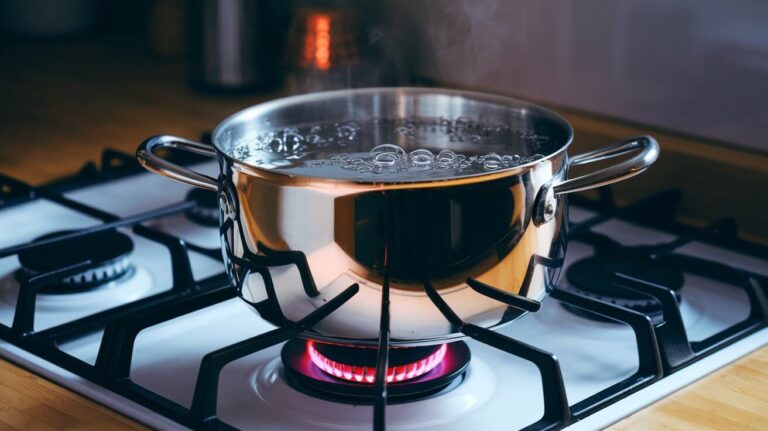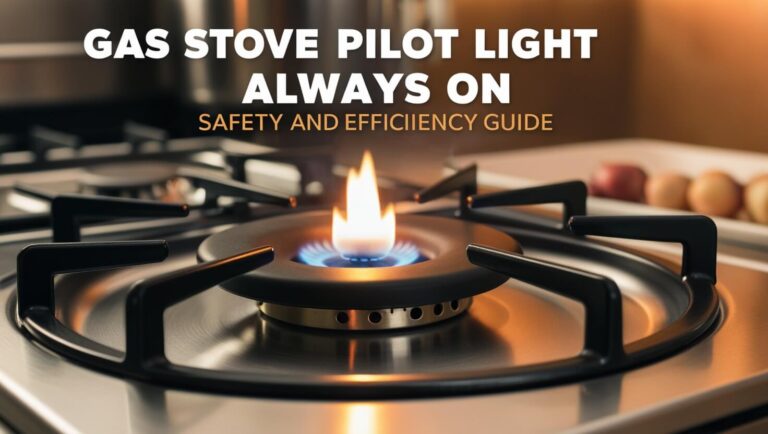
Boiling water on a gas stove is a fundamental cooking skill that everyone should master. Whether you’re preparing pasta, brewing tea, or sterilizing equipment, knowing how to efficiently boil water on your gas stove can save time, energy, and money. This guide covers everything from choosing the right equipment to troubleshooting common issues, ensuring you become an expert in no time.
Why Boiling Water on a Gas Stove Matters
Boiling water might seem like a simple task, but doing it correctly on a gas stove can make a significant difference in your cooking and daily life.
Energy Efficiency and Cost Savings
Gas stoves offer precise control over heat, allowing you to adjust the flame to achieve the perfect boil. By mastering this skill, you can:
- Reduce energy consumption
- Lower your gas bills
- Minimize wasted heat
Learning to boil water efficiently on your gas stove is an easy way to become more environmentally conscious and budget-friendly in the kitchen.
Culinary Applications of Properly Boiled Water
Perfectly boiled water is crucial for many recipes and cooking techniques:
- Pasta and grains cook evenly
- Tea and coffee taste better
- Blanching vegetables becomes more effective
Mastering this skill enhances the quality of your meals and beverages, elevating your overall culinary experience.
Essential Equipment for Boiling Water on Gas Stoves
Having the right tools makes boiling water on a gas stove easier and more efficient.
Choosing the Right Pot or Kettle
Selecting the appropriate vessel for boiling water is crucial. Consider these factors:
- Material: Stainless steel, copper, and aluminum conduct heat well
- Size: Match the pot to the amount of water you typically boil
- Base thickness: A thicker base distributes heat more evenly
For everyday use, a medium-sized stainless steel pot with a heavy bottom is versatile and durable.
Gas Stove Features to Consider
Not all gas stoves are created equal. Look for these features to improve your water-boiling experience:
- Multiple burner sizes for different pot sizes
- High BTU output for faster boiling
- Precise flame control for better temperature management
Understanding your stove’s capabilities helps you make the most of its features when boiling water.
Step-by-Step Guide to Boiling Water on a Gas Stove
Follow these steps to boil water efficiently and safely on your gas stove.
Preparing Your Workspace
Before you start:
- Clear the area around your stove
- Ensure proper ventilation
- Have pot holders or oven mitts nearby
A clean, organized workspace promotes safety and efficiency when boiling water.
Filling the Pot with Water
Proper water levels are key:
- Use cold tap water for best results
- Fill the pot about 2/3 full to prevent boiling over
- Consider the amount of water needed for your task
Remember, overfilling can lead to longer boiling times and potential spills.
Igniting the Gas Burner Safely
Safety first when lighting your gas stove:
- Turn the burner knob to the “Light” position
- Use the automatic igniter or a long-handled lighter
- Confirm the flame is lit and adjust as needed
Always be cautious when working with gas appliances to prevent accidents.
Adjusting the Flame for Optimal Boiling
Fine-tuning the flame is crucial:
- Start with high heat to bring water to a boil quickly
- Reduce to medium-high once bubbles form
- Maintain a steady, rolling boil without overflowing
Proper flame adjustment saves energy and prevents boil-overs.
The Science Behind Boiling Water on Gas Stoves
Understanding the physics of boiling water can help you optimize the process.
Understanding Heat Transfer in Gas Cooking
Gas stoves use convection and conduction to heat water:
- Convection: Hot air rises around the pot
- Conduction: Heat transfers directly from flame to pot
This combination of heating methods makes gas stoves efficient for boiling water.
Factors Affecting Boiling Time
Several elements influence how quickly water boils:
- Initial water temperature
- Altitude (water boils at lower temperatures at higher elevations)
- Pot material and thickness
- Lid usage
Considering these factors helps you predict and optimize boiling times.
Tips to Boost Efficiency When Boiling Water on Gas Stoves
Maximize your gas stove’s performance with these expert tips.
Lid Techniques for Faster Boiling
Using a lid correctly can significantly reduce boiling time:
- Cover the pot to trap heat
- Leave a small gap to prevent boiling over
- Remove the lid once boiling begins for some dishes
A well-fitted lid can cut boiling time by up to 50%.
Optimizing Burner Size and Pot Diameter
Match your pot to the right burner for best results:
- Use large burners for big pots
- Small burners work well for kettles and small pans
- Ensure the flame doesn’t extend beyond the pot’s base
Proper burner-to-pot matching improves efficiency and safety.
Common Mistakes to Avoid When Boiling Water on Gas Stoves
Steer clear of these errors to boil water like a pro.
Overflowing and Spillage Prevention
Avoid messy boil-overs with these strategies:
- Don’t overfill your pot
- Reduce heat when bubbles start forming
- Use a wooden spoon across the pot to break surface tension
These simple tricks keep your stovetop clean and your water boiling smoothly.
Handling Gas Stove Safety Concerns
Stay safe while boiling water:
- Keep flammable items away from the stove
- Turn pot handles inward to prevent accidents
- Never leave boiling water unattended
Prioritizing safety ensures a worry-free cooking experience.
Comparing Gas Stove Water Boiling to Other Methods
How does gas stack up against other water-boiling options?
Gas vs. Electric Stoves for Boiling Water
Gas and electric stoves have distinct advantages:
- Gas: Faster heating, better control
- Electric: More even heat distribution, easier cleaning
Gas stoves often edge out electric models for boiling water quickly.
Stovetop vs. Electric Kettles: Pros and Cons
Consider these factors when choosing between stovetop and electric kettles:
- Stovetop: More versatile, no extra appliance needed
- Electric: Faster, more energy-efficient for small amounts
Your choice depends on personal preference and specific needs.
Troubleshooting Gas Stove Water Boiling Issues
Encounter problems? Here’s how to solve common water-boiling challenges.
Addressing Slow Boiling Times
If your water takes too long to boil:
- Check for mineral buildup in the pot
- Ensure the gas line isn’t obstructed
- Verify the burner holes aren’t clogged
Regular maintenance can prevent most slow boiling issues.
Dealing with Uneven Heating
Uneven heating can affect boiling performance:
- Use pots with thick, flat bottoms
- Rotate the pot occasionally during heating
- Consider using a heat diffuser for problematic burners
These solutions help distribute heat more evenly for better boiling.
Creative Uses for Boiled Water from Your Gas Stove
Boiled water isn’t just for cooking – explore these innovative applications.
Culinary Applications Beyond Basic Cooking
Expand your culinary horizons with boiled water:
- Create infused waters with herbs and fruits
- Pre-heat serving dishes for better temperature retention
- Quickly thaw frozen ingredients
Boiled water is a versatile tool in any kitchen.
Non-Culinary Uses for Boiled Water
Boiled water has many uses outside of cooking:
- Clean and disinfect kitchen tools
- Remove candle wax from surfaces
- Soothe sore throats with steam inhalation
Keep these handy tips in mind for everyday problem-solving.
Maintaining Your Gas Stove for Optimal Water Boiling
Regular care keeps your gas stove in top boiling condition.
Cleaning and Care Tips
Maintain your stove with these simple steps:
- Wipe down burners and grates regularly
- Clean food spills promptly to prevent buildup
- Check and clean gas ports periodically
A clean stove boils water more efficiently and safely.
When to Seek Professional Maintenance
Know when to call in the experts:
- If you smell gas when the stove is off
- When burners produce yellow flames instead of blue
- If igniters stop working consistently
Professional maintenance ensures your gas stove remains safe and effective.
Environmental Considerations of Boiling Water on Gas Stoves
Understand the ecological impact of your water-boiling habits.
Energy Consumption and Carbon Footprint
Gas stoves have environmental pros and cons:
- Pro: Efficient heat transfer for quick boiling
- Con: Fossil fuel consumption contributes to carbon emissions
Being mindful of your usage helps minimize environmental impact.
Eco-Friendly Practices for Gas Stove Use
Reduce your environmental footprint with these tips:
- Boil only the amount of water you need
- Use residual heat to finish cooking when possible
- Consider carbon offset programs if you’re a heavy user
Small changes in habits can make a big difference for the planet.
Frequently Asked Questions About Boiling Water on Gas Stoves
Get answers to common queries about boiling water on gas stoves.
Safety Concerns and Best Practices
Q: Is it safe to leave water boiling on a gas stove? A: Never leave boiling water unattended. Always stay in the kitchen and keep an eye on the pot to prevent accidents.
Q: How can I prevent my pot from boiling over? A: Don’t overfill the pot, reduce heat when bubbles form, and use a wooden spoon across the top to break surface tension.
Optimizing Boiling for Different Altitudes
Q: Does altitude affect boiling time on a gas stove? A: Yes, water boils at lower temperatures at higher altitudes, which can increase boiling time. Adjust cooking times accordingly.
Q: How do I adjust recipes for high-altitude boiling? A: Generally, increase cooking times by about 1 minute for every 1,000 feet above sea level for boiled foods.
Conclusion: Perfecting Your Gas Stove Water Boiling Technique
Mastering the art of boiling water on a gas stove is a valuable skill that enhances your cooking abilities and daily life. By understanding the science, using the right equipment, and following best practices, you can boil water efficiently, safely, and with minimal environmental impact. Remember to maintain your gas stove regularly and always prioritize safety in the kitchen. With these tips and techniques, you’ll be a water-boiling expert in no time, ready to tackle any culinary challenge that comes your way.






